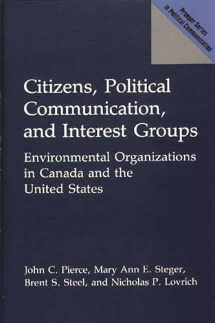
Citizens, Political Communication, and Interest Groups: Environmental Organizations in Canada and the United States (Praeger Series in Political Communication)
Book details
Summary
Description
This intriguing book investigates the technical information quandary created by post-industrial changes, which have produced demands for citizen involvement in public policy processes while complex scientific and technical issues increasingly make public involvement difficult. Authors Pierce, Steger, Steel, and Lovrich address the degree to which interest groups might serve to bridge the knowledge gap between public policy processes and the citizenry in U.S. and Canadian settings.
The focus of the study is on acid rain policy in Michigan and Ontario, an area of considerable scientific and technical complexity as well as political and public interest. The authors examine how the U.S. and Canadian publics acquire, process, and communicate policy-relevant information so that it can influence policymaking. Do interest groups play the information dissemination role in a manner that could address the technical information quandary? Are interest groups playing the same or different roles in the United States and Canada? What different factors cause U.S. and Canadian interest groups to behave as they do in the political arena? Recommended for scholars of Political Science, Communication, Environmental Studies, and Comparative Public Policy.


We would LOVE it if you could help us and other readers by reviewing the book
Book review



